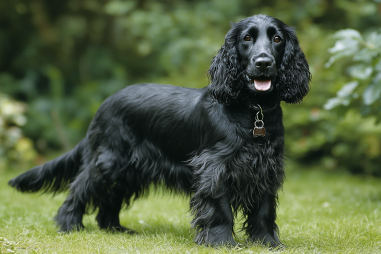Allergies can be a significant challenge for English Cocker Spaniel owners, as these lovable dogs are prone to various allergic reactions that affect their comfort and overall health. Knowing how to recognize allergies, understanding their causes, and learning effective care and prevention strategies can improve your furry friend’s quality of life. This guide offers practical advice to help you manage allergies in your English Cocker Spaniel and keep their tail wagging happily.
Common Allergies in English Cocker Spaniels
English Cocker Spaniels are known for their beautiful coats and friendly nature, but they can also be susceptible to different types of allergies. The most common allergies in this breed include environmental allergies, food allergies, and flea allergy dermatitis. Each of these can present unique challenges and require specific approaches to care.
Environmental allergies, or atopy, are often triggered by allergens like pollen, mold spores, dust mites, or grasses that your dog encounters outdoors or inside your home. These allergens tend to be seasonal but can cause year-round discomfort in some dogs.
Food allergies usually arise from an immune reaction to certain ingredients such as beef, dairy, wheat, or chicken. Unlike food intolerances, true food allergies involve the immune system and can cause skin and digestive issues.
Flea allergy dermatitis is caused by a hypersensitivity to flea saliva. Even a few flea bites can provoke intense itching and skin inflammation in sensitive English Cocker Spaniels.
Signs and Symptoms to Watch For
Recognizing the signs of allergies in your English Cocker Spaniel is crucial for timely intervention. Common symptoms often involve the skin, ears, and digestive system. These can include:
- Excessive scratching, licking, or chewing of the paws, face, and ears
- Red, inflamed, or flaky skin, sometimes with hair loss
- Frequent ear infections characterized by redness, odor, or discharge
- Chronic sneezing, watery eyes, and nasal discharge
- Digestive upset such as vomiting or diarrhea (often related to food allergies)
If you notice these symptoms persisting or worsening, it’s essential to take steps to identify the cause and provide relief to your dog.
Environmental and Food Allergens
Environmental Allergens
Environmental allergens can be found both indoors and outdoors. Pollen from trees, grasses, and weeds is one of the most common culprits, especially during spring and summer months. Dust mites and mold spores also trigger allergic responses, even within a home setting. Reducing your pet’s exposure to these allergens can help reduce symptoms.
Food Allergens
Food allergies may develop at any age, though they often present early in a dog’s life. The most frequent causes involve common protein sources like beef, chicken, lamb, and dairy products; however, dogs can develop allergies to almost any food item. Symptoms related to food allergies often include itchy skin or digestive signs, so tracking your dog’s diet and symptoms is key.
Treatment Options
Managing allergies in English Cocker Spaniels usually involves a combination of treatments tailored to the specific allergy and symptoms your dog is experiencing. Some common treatment options include:
- Antihistamines: These can help reduce itching and inflammation but may be less effective for severe reactions.
- Corticosteroids: Often prescribed for short-term use during flare-ups to minimize inflammation and itching.
- Fatty acid supplements: Omega-3 and Omega-6 fatty acids support skin health and reduce inflammation.
- Medicated shampoos: Special cleansers designed to remove allergens and soothe irritated skin.
- Immunotherapy: Allergy shots or oral drops that gradually desensitize your dog to specific allergens over time.
- Flea control: Strict flea prevention regimens are necessary to control flea allergy dermatitis.
- Diet trials: Used to determine and eliminate food allergens through an elimination diet supervised by your veterinarian.
Preventative Measures
Prevention is often the best approach to managing allergies in your English Cocker Spaniel. Some effective preventive care tips include:
- Regular grooming: Frequent baths with hypoallergenic or medicated shampoos help wash away pollen and environmental allergens from your dog’s coat.
- Environmental management: Keep your home clean and dust-free, use air purifiers, and limit your dog’s access to high-pollen areas during peak seasons.
- Quality diet: Feeding a balanced, high-quality diet appropriate for your dog’s needs helps support overall immune health.
- Routine flea prevention: Use veterinarian-recommended flea control products year-round to prevent flea bites before they start.
- Consult a vet for allergy testing: Identifying specific allergens can guide more targeted prevention strategies and treatments.
When to Consult a Veterinarian
If you suspect your English Cocker Spaniel has allergies, it’s important to work with your veterinarian promptly. They can help determine the root cause through physical exams, skin tests, and food trials. Severe or chronic allergic reactions can lead to secondary infections or more serious health issues, so early intervention is key.
Veterinarians can also recommend appropriate medications or treatments tailored to your dog’s condition and monitor their progress to ensure effective management. Never self-medicate your dog or ignore persistent symptoms, as untreated allergies can greatly impact your dog’s happiness and wellbeing.
Supporting Your English Cocker Spaniel’s Comfort and Health
Caring for an English Cocker Spaniel with allergies requires patience, observation, and a proactive approach. By recognizing the types of allergies common in this breed and understanding how to minimize exposure to allergens, you set the stage for a healthier, more comfortable life for your furry companion. Collaborating closely with your veterinarian and following tailored treatment and prevention strategies can make all the difference.
With consistent care and attention, your English Cocker Spaniel can overcome the challenges of allergies and continue to bring joy and companionship into your home for many years to come.







